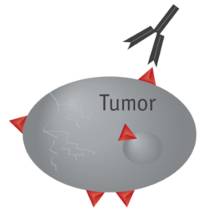- LATEST NEWS -
News and Updates are now collated on our Linkedin page
mi-THERAPEUTICS PIPELINE
An unusual cell surface localization of Hsp70 has been demonstrated on a large variety of solid tumors including lung, colorectal, breast, squamous cell carcinomas of the head and neck, prostate and pancreatic carcinomas, glioblastomas, sarcomas and hematological malignancies, but not on corresponding normal tissues.
multimmune's strategy is to build a well-staged pipeline of differentiated products for the targeted therapy (tx) of cancer. All platforms are based on the widely-expressed tumor specific target - the membrane form of Hsp70.
- Ex vivo activation of natural killer (NK) cells using a synthetic peptide which mimics Hsp70 (ENKASTIM-ev, End-Phase I and ongoing Phase II product);
- In vivo activation of natural killer (NK) cells using a synthetic Hsp70 peptide (ENKASTIM-iv, Pre-clinical product);
- Specific direct targeting of tumors using an antibody against the membrane form of the Hsp70 molecule (mi-TUMEXtx, Pre-clinical product);
ENKASTIM
ENKASTIM is based on the activation of immune cells called natural killer (NK) cells that are major players in the body's first line of defense, also called innate immunity. The immune effector cells are activated ex vivo (outside the body; ENKASTIM-ev) or in vivo (inside the body; ENKASTIM-iv).
Indication: ALL tumors and metastases on which surface-bound Hsp70 is present.
Market: Given that ENKASTIM-iv has the potential to be effective against ~ 50-70% of all tumors, it could therefore command a substantial market share and incur dramatically lower pipeline development and delivery costs.
ENKASTIM-ev is an innovative product candidate representing a new class of therapy known as Active Cellular Immunotherapies (ACIs). ACI is a treatment approach which capitalizes on the power of vital human cells to re-engage the patient's own immune system to fight cancer. The product induces a targeted immune response against surface-bound heat shock protein 70 (Hsp70). Surface-bound Hsp70 is a tumor-specific marker which is expressed on about 50-75% of various cancer entities, eg lung, colon, breast, pancreas.
Ex vivo stimulation of ENKASTIM-ev, an Hsp70-based GMP-grade synthetic peptide comprising 14 amino acids (14mer, TKD), results in a specific activation of NK cells with targeting and killing ability towards membrane Hsp70-positive tumors and metastases.
Approach: Immune effector cells are obtained from patients by blood collection (leukapheresis). NK cells are incubated in culture bags (ex vivo) with Hsp70 peptide / Interleukin-2 for several days in a closed system. Following quality control and sterility testing the therapeutic is delivered as an intravenous infusion.
Status: The efficiency of ex vivo stimulated effector cells in killing tumors has been demonstrated in pre-clinical mouse models and in patients with colorectal and lung carcinomas.
Phase I Clinical Pilot Study: Feasibility and safety of ENKASTIM-ev (ex vivo), has been proven in patients with colorectal and lung carcinomas in a Phase I Clinical Pilot Study at the University Hospital of Regensburg (Krause et al, 2004).
Phase II Clinical Study: A randomized multi-center Phase II clinical trial in patients with Stage IIIb inoperable non small lung cell carcinoma (NSCLC) following radio (chemo) therapy (follow links on right for description of trial) has demonstrated that ENKASTIM-ev delivered clinical benefit in 5 out of 7 patients (71%; median Progression Free Survival (PFS) 13 months; including one patient who left the trial after 15 months PFS - see Case Study below), with one complete response. This contrasts with 2 out of 7 patients (28%, median PFS 8 months) deriving clinical benefit from the radio (chemo) therapy alone in the control group (Multhoff et al., 2020) .
mi-TUMEXtx: A therapeutic monoclonal antibody recognising membrane Hsp70
mi-TUMEXtx is a targeted antibody which has the potential to be used for the treatment of most tumor types. The product targets surface-bound heat shock protein 70 (Hsp70), a tumor-specific marker expressed on about 50-75% of various cancer entities, e.g. lung, colon, breast, pancreas.
The administration of mi-TUMEXtx, a unique monoclonal antibody which recognises the membrane form of Hsp70, induces Antibody-Dependent Cellular Cytotoxicity (ADCC) of membrane Hsp70-positive tumors and metastases, while sparing healthy cells. Furthermore, the product can be used in a "magic bullet" approach, as it can be designed to deliver a cytotoxic conjugate directly, and specifically, to tumor cells.
Indication: ALL tumors and metastases on which surface-bound Hsp70 is present. Pre-clinical development in colorectal cancer is ongoing, and further studies in pancreatic and lung cancer are planned.
Market: Monoclonal antibody-based therapeutics for the treatment of cancer generate significant global revenues: e.g. Avastin ($6.3 billion), Herceptin ($6 billion) and Rituxan ($7 billion) alone generated ~$20 billion revenue in 2012 (THE DEAL ROOM - Monoclonal Antibodies Continue to Drive Biotech Investment, 2013). Given that mi-TUMEXtx has the potential to be effective against ~50-75% of all tumors, it could therefore command a substantial market share and incur dramatically lower pipeline development and delivery costs.
Status: proof of principle has been demonstrated in a pre-clinical colon tumor mouse model. In these studies, three repeated injections of the antibody resulted in a 70% reduction in the tumor size .
